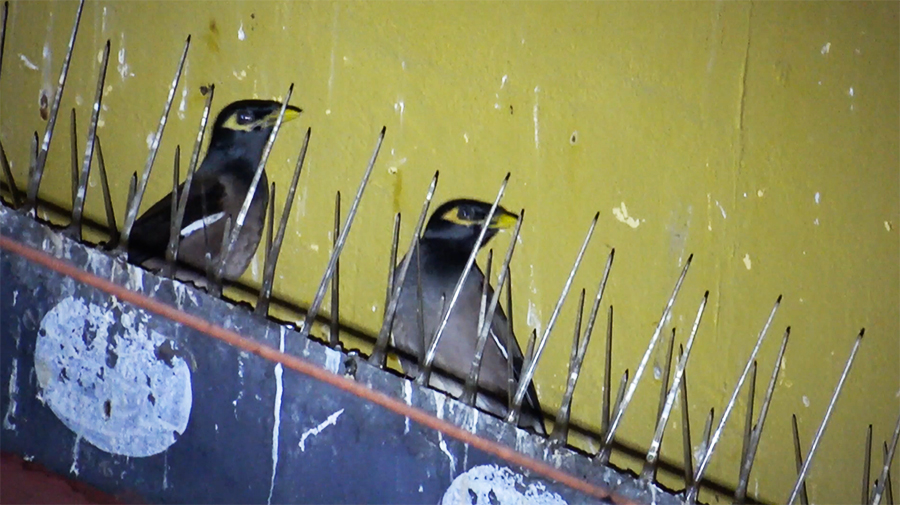 What began as a few birds gathering quietly at dusk has turned into a nightly ordeal for Gelephu town residents. The rising number of myna birds, or rupi as they are locally known, is pushing patience to its limits, disturbing sleep and creating sanitation concerns across the core town area. Internationally, the myna bird is known for being one of the world’s worst invasive species.
What began as a few birds gathering quietly at dusk has turned into a nightly ordeal for Gelephu town residents. The rising number of myna birds, or rupi as they are locally known, is pushing patience to its limits, disturbing sleep and creating sanitation concerns across the core town area. Internationally, the myna bird is known for being one of the world’s worst invasive species.
 The common myna, or rupi, may be small and adorable, but in large numbers, they are pushing the patience of Gelephu residents to the limit.
The common myna, or rupi, may be small and adorable, but in large numbers, they are pushing the patience of Gelephu residents to the limit.
“The birds have become much noisier these days. It wasn’t like this before. Every evening, they gather and make loud noises for hours on end. On top of that, their droppings make our surroundings dirty and unpleasant,” said Januti Mongar, a resident of Gelephu.
 Another resident, Dorji Chedup said, “The Thromde has tried several ways to drive the birds away, using torchlights and loud sounds, but nothing seems to work. The birds fly off for a while, only to come back again. We’ve run out of options and have to live with the noise.”
Another resident, Dorji Chedup said, “The Thromde has tried several ways to drive the birds away, using torchlights and loud sounds, but nothing seems to work. The birds fly off for a while, only to come back again. We’ve run out of options and have to live with the noise.”
 “We chase them away, but they always return within minutes. Sometimes, they start making noise as early as two in the morning. It disturbs our sleep, and we have to wake up and drive them away again,” said Bishnu Maya Tamang, also a resident of Gelephu.
“We chase them away, but they always return within minutes. Sometimes, they start making noise as early as two in the morning. It disturbs our sleep, and we have to wake up and drive them away again,” said Bishnu Maya Tamang, also a resident of Gelephu.
Research by the International Union for Conservation of Nature lists the common myna among the top invasive alien species globally. Countries like Australia, New Zealand, and South Africa have declared them invasive and implemented control programmes. Studies show mynas are highly territorial, often driving away native birds, destroying eggs, and taking over nests.
As per bird specialists in Bhutan, common mynas have not been formally studied yet, but initial observations suggest they offer little ecological benefit and quickly become a nuisance.
 Gelephu Thromde has been trying several methods to control the growing myna population. They began by instructing shopkeepers and residents to stop feeding the birds, and advised building owners to seal ceiling gaps and nesting spaces.
Gelephu Thromde has been trying several methods to control the growing myna population. They began by instructing shopkeepers and residents to stop feeding the birds, and advised building owners to seal ceiling gaps and nesting spaces.
 Anti-roosting spikes were installed on window shells, and galvanised iron wires were placed on BPC cable lines to prevent the birds from landing. Teams were also deployed every evening to chase the birds away using sonic tools, lights, and laser deterrents. However, the birds returned shortly after each attempt, showing a strong ability to adapt to repeated deterrents. With support from bird specialists, the thromde is currently studying the birds’ behaviour and exploring possible relocation plans.
Anti-roosting spikes were installed on window shells, and galvanised iron wires were placed on BPC cable lines to prevent the birds from landing. Teams were also deployed every evening to chase the birds away using sonic tools, lights, and laser deterrents. However, the birds returned shortly after each attempt, showing a strong ability to adapt to repeated deterrents. With support from bird specialists, the thromde is currently studying the birds’ behaviour and exploring possible relocation plans.
For now, the residents of Gelephu remain locked in a nightly battle with their feathered visitors. And until a long-term, behaviour-based plan is in place, the noise and the sleepless nights are likely to continue.
Passang Dorji, Gelephu









